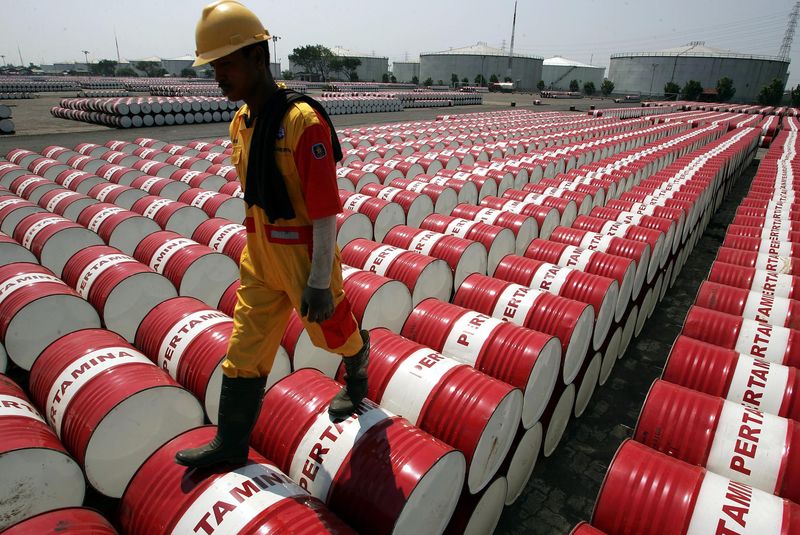By Swetha Gopinath and David Henry
April 11 (Reuters) - Nearly two years into an epic oil rout,
U.S. shale drillers that have upended global energy markets are
finally feeling a credit squeeze as banks make their biggest
cuts yet to their loans.
Every six months, oil and gas producers and their banks
negotiate how much credit they should be given based on the
value of their reserves in the ground.
In previous reviews, banks were willing to offer borrowers
some leeway, encouraged by producers' hedges against falling
prices and their ability to keep cutting costs in step with
crude's slide that began in mid-2014.
This time, with many companies' hedges largely gone and
crude prices used in the reviews as much as 20 percent lower
than six months earlier, banks are getting tough.
Just a few weeks into the current round of talks more than a
dozen companies have had their loans cut by a total of $3.5
billion, equivalent to a fifth of available credit, according to
data compiled by Reuters. (Graphic:http://tmsnrt.rs/1S9304F
]
At that rate, $10 billion more of bank credit will disappear
as a remaining $50 billion or so of credit lines come under
scrutiny in talks that stretch into May.
Companies and bankers contacted by Reuters declined to
comment beyond their public statements due to the sensitive
nature of the talks.
The squeeze puts further pressure on the shale industry to
sell assets, cut jobs and drilling and shrink capital spending.
It also raises the risk that more companies will tip into
bankruptcy.
Banks are also under more pressure now from regulators to
limit their energy-related risks as the downturn drags on.
The next credit review in the autumn could take an
additional toll if oil prices, now below $40 a barrel, do not
rebound.
"Any company that does not have a widely profitable base at
this current price is going to find it very, very hard," said
Christian Ledoux, senior portfolio manager at South Texas Money
Management.
About 36 percent of some 150 energy companies with
speculative grade debt will probably default on their
obligations by the end of next year if oil holds around $35 a
barrel, said Tarek Hamid, senior U.S. credit analyst at JPMorgan (NYSE:JPM)
Chase & Co.
More than 50 North American oil and gas producers have
entered bankruptcy since early 2015, according to a Reuters
review of regulatory filings and other data.
Oil and gas producers rely on revolving credit to finance
day-to-day operations and cuts force them to looks for cash
elsewhere.
Clayton Williams Energy Inc CWEI.N , for example, which had
its credit line slashed to $100 million from $450 million,
borrowed the difference from Ares Management LP, ARES.N an
alternative asset investor that charged triple the rate of the
banks.
Fearing that falling crude prices and reserve values could
push many companies into default, companies and bankers have
been also renegotiating financial performance tests and claims
on assets while resetting the borrowing limits.
Some companies, including Eclipse Resources Corp ECR.N and
California Resources Corp, CRC.N have disclosed that banks
have agreed to loosen, or even suspend, minimum financial
requirements to give them more flexibility.
Sometimes banks rewrite clauses that might have allowed
lower classes of lenders to throw borrowers into default and
suddenly trigger repayment requirements and cause bankruptcies,
according to lawyers and analysts tracking the talks.
"Typically bank lenders don't want second- and third-lien
lenders to have that first bite at the apple," said Lindsay
Sparks, a partner at law firm Paul Hastings LLP.
To the alarm of banks, some highly indebted companies, such
as Linn Energy LLC, LINE.O drew heavily on their credit lines
ahead of their loan talks, lawyers and analysts said.
A spokesman for Linn declined to comment.
"This defensive measure has emerged as a somewhat
surprising-and troubling-trend with broad ramifications for
lenders," said FBR & Co analyst Chad Mabry.
In response some banks have insisted on "anti-hoarding"
provisions that would give them more say over what companies do
with cash and other assets that could go toward repaying the
loans.
In February, Phil Rykhoek, chief executive of Denbury
Resources Inc DNR.N told investors after loan talks with a
syndicate of banks, that lenders agreed to easier financial
tests in exchange for accepting such a provision.
The "anti-hoarding" provision limits how much cash Denbury
can hold before drawing more on its credit line. It was not
directed at Denbury, Rykhoek said, as much as it was a new
defensive by banks in response to seeing other companies draw on
their lines to take lender cash with them as they approached
bankruptcy.
"It was very important to them," Rykhoek said.
<^^^^^^^^^^^^^^^^^^^^^^^^^^^^^^^^^^^^^^^^^^^^^^^^^^^^^^^^^^^
U.S. oil, gas reserve-based loan cuts http://tmsnrt.rs/1S9304F
FACTBOX-U.S. oil and gas loan reviews
^^^^^^^^^^^^^^^^^^^^^^^^^^^^^^^^^^^^^^^^^^^^^^^^^^^^^^^^^^^>
